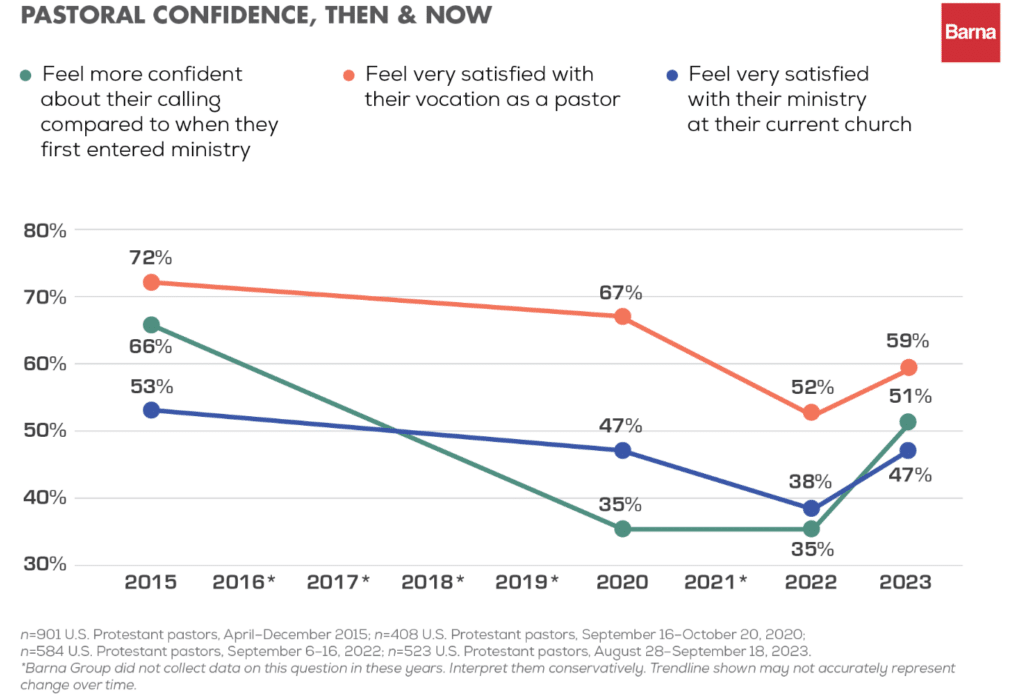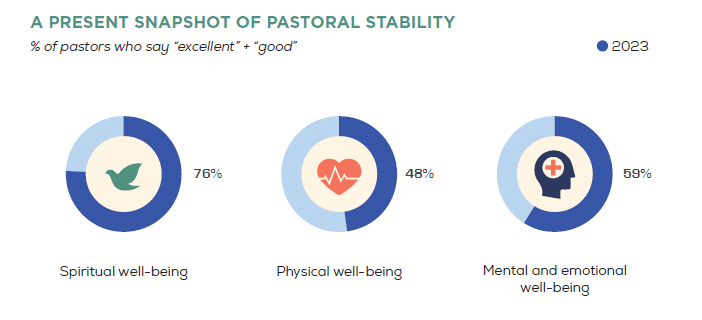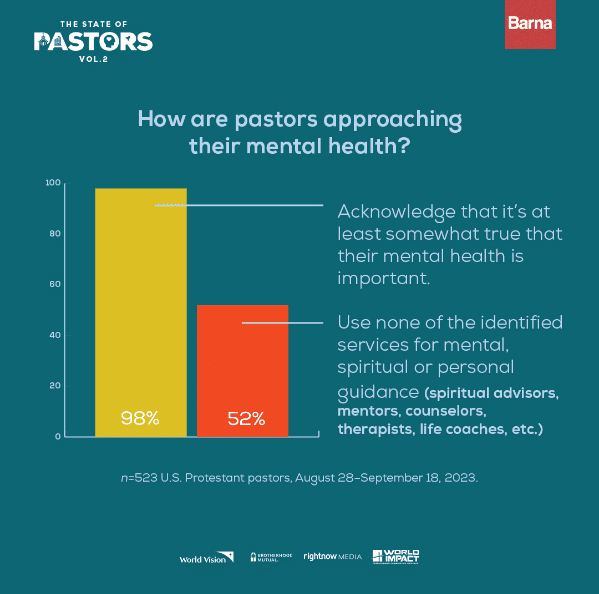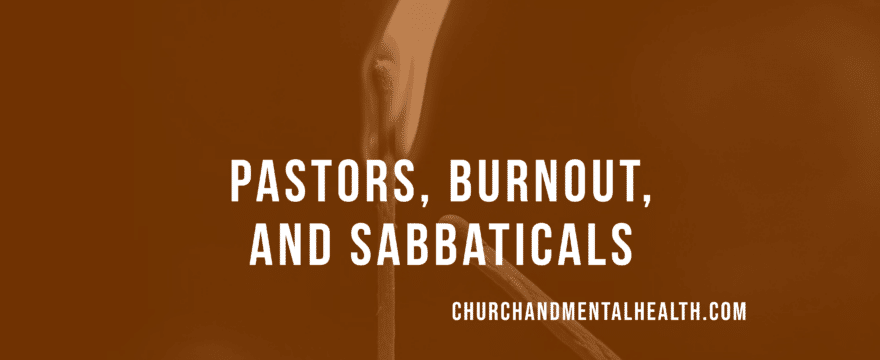Pastor burnout is a thing. We’ve talked about it quite a few times here. But it’s a topic that will need to be talked about routinely for a long while. Want evidence of the need? Check out the newest data collected by Barna Group in the State of Pastors, Volume 2, which has seen some stark negative and positive changes in recent years concerning work satisfaction and personal stability for pastors. Here are some of the highlights to coincide with our point:

In the last four years, there has been a rollercoaster of a pastor’s confidence in their ministry with reduced confidence a pastor has in their calling, satisfaction in their vocation, and feeling satisfied with their ministry. It makes sense now that the COVID lockdown was not helpful for ministry leaders. Numbers started to plunge deeply in 2020 and only recently have begun to go up, but they are well below where they were in 2015. Thankfully, there was a more in-depth look recently in what the pastor feels about their stability in their work.

However, even with this positive outlook, one significant data point was highlighted in the study, which I find true in many conversations with pastors. 98% of the pastors studied acknowledge that their mental health is essential. Yet, when presented with a list of services people often turn to for mental, spiritual, or personal guidance, most pastors (52%) say they’re using none.

As shepherds of their flock, pastors are profoundly responsible for guiding, comforting, and nurturing their congregations. However, in their unwavering commitment to serving others, pastors often neglect their well-being, leading to burnout—an all-too-common affliction in the ministry. Christian counselors must equip pastors with the tools and strategies necessary to recognize, prevent, and overcome burnout, ensuring they continue to fulfill their divine calling with joy and vitality.
Understanding Burnout in Pastoral Ministry
Burnout among pastors is not merely a result of excessive workload or stress but rather a complex interplay of emotional, spiritual, and physical exhaustion. It is a gradual erosion of passion, purpose, and satisfaction in ministry, accompanied by disillusionment, cynicism, and detachment. Pastors may experience a profound sense of loneliness and isolation despite being surrounded by their congregation. Moreover, the stigma associated with seeking help within the church community often exacerbates their suffering, leading them to suffer in silence.
Even though things seem to be on the rise, the importance of talking about this now is that we have to deal with this couple of years of problems. Sweeping it under the rug, covering everything up with “it’s fine now,” and not untangling the knot of previous problems will only lead to further issues. Too often, we see people struggling with unresolved baggage, even when things are going well. It’s unhealthy, and we should be models for doing it right for our congregation and community.
(We have shared previously about Spiritual First Aid, which is a great resource for pastors and lay leaders to better understand this and help better understand these warning signs, preventing burnout, and dealing with stressors.)
Recognizing the Warning Signs
Pastors must recognize the warning signs of burnout before it reaches a critical stage. We encourage you to take their more comprehensive course. Common indicators include:
- Physical Symptoms: Persistent fatigue, sleep disturbances, headaches, and gastrointestinal issues.
- Emotional Signs: Irritability, mood swings, anxiety, and feelings of helplessness or hopelessness.
- Cognitive Decline: Difficulty concentrating, memory lapses, indecisiveness, and impaired judgment.
- Spiritual Disconnection: Loss of passion for ministry, spiritual doubt, and a sense of spiritual dryness or emptiness.
- Relational Strain: Strained relationships with family, friends, and congregants, withdrawal from social activities, and increased conflict.
Preventing Burnout
Prevention is the cornerstone of addressing burnout among pastors. Encourage pastors to prioritize self-care and establish healthy boundaries to safeguard their physical, emotional, and spiritual well-being. Here are some preventive measures:
- Self-Care Practices: Encourage pastors to prioritize regular exercise, adequate rest, healthy nutrition, and leisure activities that rejuvenate their mind, body, and spirit.
- Boundaries: Assist pastors in setting realistic expectations for their workload and schedule. Teach them to say no to additional commitments when necessary and to delegate tasks to capable individuals within the congregation.
- Community and Support: Foster a culture of openness and vulnerability within the church community, where pastors feel safe seeking support and encouragement from fellow clergy, mentors, and trusted friends.
- Spiritual Nourishment: Emphasize the importance of maintaining a vibrant spiritual life through regular prayer, meditation, Scripture study, and fellowship with other believers.
Overcoming Burnout
For pastors already grappling with burnout, it is essential to provide compassionate support and guidance as they navigate their journey toward healing and restoration. Offer the following strategies:
- Seek Professional Help: If anything stands out, it should be the chart pastors recited on how mental health is important, they just do not do anything for themselves. Encourage pastors to seek the assistance of a qualified Christian counselor or therapist who can provide specialized support to their unique needs.
- Rediscover Purpose: Help pastors reconnect with their calling and rediscover the joy and passion that initially led them into ministry. Start up a pastoral network meeting where senior pastors meet with senior pastors from other churches to uphold each other. Youth pastors collaborate in supporting each other. Encourage them to reflect on their strengths, values, and the transformative impact of their work.
- Practice Self-Compassion: Assist pastors in cultivating self-compassion and grace toward themselves, recognizing that they are human beings with limitations and vulnerabilities. Encourage them to release unrealistic expectations and embrace imperfection.
- Renewal and Restoration: Rest is good. This is one of several coping skills you could implement from our 99 Self-Care Techniques for Christians. Encourage pastors to engage in activities that promote spiritual renewal and emotional restoration, such as retreats, sabbaticals, and spiritual disciplines. If you decide to take a sabbatical, we came up with several ideas pastors should consider for a sabbatical, all from counselors who wanted to share a thought.
Addressing burnout among pastors requires a multiple pronged approach that encompasses prevention, recognition, and intervention. As Christian counselors, let us rally behind our pastoral leaders, providing them with the support, encouragement, and resources they need to navigate the challenges of ministry with resilience, vitality, and unwavering faith. Together, let us nurture the shepherds who tirelessly tend to Christ’s flock, ensuring that they continue to shine the light of God’s love and grace in a world desperately in need of hope and healing.
